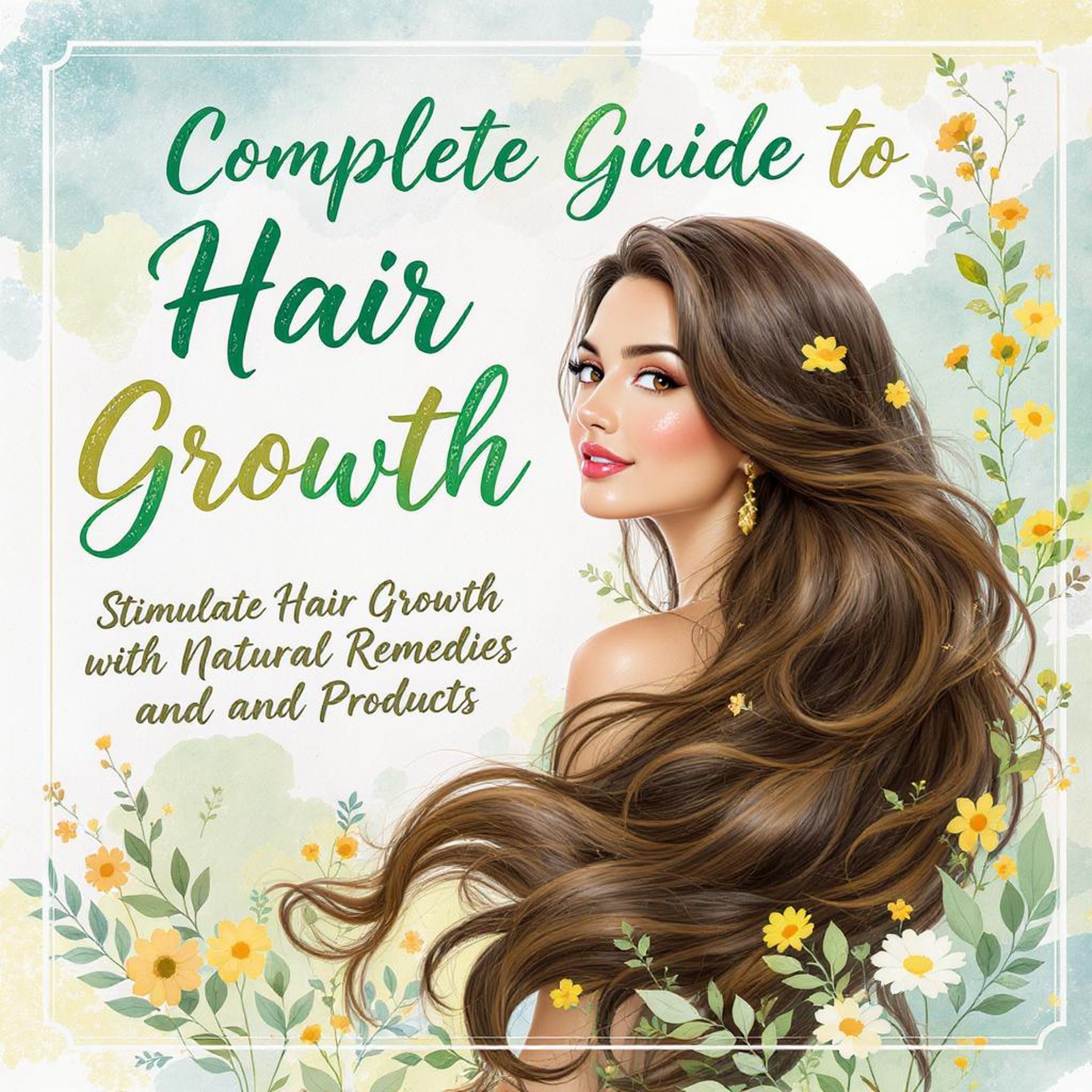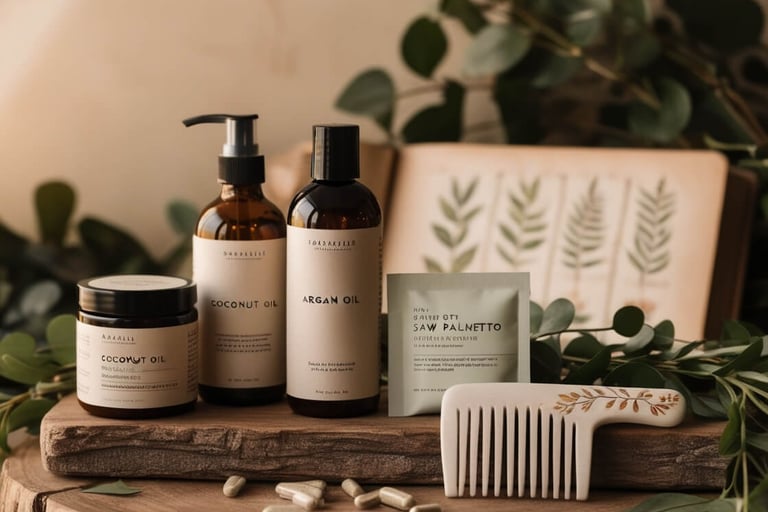Discover a special selection of items

Hair Loss Prevention: Grow Strong, Healthy Hair Naturally
Discover how to prevent hair loss and stimulate growth. Complete guide with tips, natural remedies, and the best products for stronger, more abundant hair.
BEAUTY AND WELLNESS
Alexandra A.
6/5/2025
Understanding Hair Loss: What Are the Causes?
Have you ever looked at your hairbrush and noticed more strands than usual? Or maybe your ponytail or bun feels less full than it used to? If so, you’re not alone. Hair loss is a concern that affects many of us, and it’s completely normal to feel a bit worried when we see our hair losing volume.
Before jumping into solutions, it’s essential to understand why our hair might be “taking a break”—or, in some cases, leaving for good. The good news is, once we identify the possible causes, we can begin to take control.
The truth is, there’s no single reason behind hair loss, It’s more like a puzzle with many pieces, and each one can impact the health of your hair. Recognizing which factor might be affecting you is the first step toward finding the right solution.
Here are some of the most common reasons you might be experiencing hair loss:


1. Genetic Factors: When It's in Our Genes
This is perhaps the most common—and often the most accepted—cause, especially in cases of male or female pattern baldness (medically known as androgenetic alopecia). If your father, mother, grandparents, or uncles experienced thinning or hair loss at a certain age, you may also have a genetic predisposition. That doesn’t mean it’s inevitable, but it does mean your hair follicles may be more sensitive to certain hormones over time, leading to gradual thinning and shedding. It’s a slow process, and while genetics play a significant role, there are ways to minimize its impact and support long-term hair health.
If genetics is one of your concerns, the good news is that the field of scalp and hair dermatology has made great advances. While we can’t change our DNA, we can support our follicles and the overall environment of the scalp. Using products specifically formulated for androgenetic alopecia that include ingredients like Minoxidil or natural DHT blockers (such as Saw Palmetto or Serenoa repens) can be a solid first step. These ingredients aim to create a more supportive environment for hair growth and reduce the miniaturization of follicles.
But keep in mind:
Although minoxidil is available over the counter in many countries, it is still a medication and may cause side effects such as irritation, redness, flaking, or unwanted hair growth if applied outside the intended area.
It is not recommended during pregnancy or breastfeeding unless advised by a healthcare professional.
For individuals with certain heart conditions or blood pressure issues, it's best to consult a doctor before using minoxidil—especially the oral form, which does require a prescription and medical supervision.
Results typically appear after 3 to 6 months of consistent use, and hair may fall out again if the treatment is discontinued.
2. Stress: A Silent Enemy of Your Hair
In our daily lives, stress has become almost unavoidable. However, what many people don’t realize is the direct impact it can have on the health of our hair. When we’re under constant pressure—whether from work, personal problems, or even traumatic events—our body reacts by releasing hormones that can “disrupt” the natural hair growth cycle.
This condition, known as telogen effluvium, causes a large number of hair follicles to prematurely shift from the growth phase to the resting phase, and then to the shedding phase. What’s most surprising is that this hair loss usually appears two to three months after the stressful event, which can make it difficult to link the two.
Managing stress is essential—not just for your overall well-being, but also for your hair. Incorporating relaxation practices like meditation, yoga, or even spending a few minutes a day on conscious breathing can make a big difference. If you're feeling overwhelmed, a beginner-friendly mindfulness book can be a great tool to start easing that tension.
Remember: your hair reflects your inner health, and caring for your mind is a key step toward stronger, healthier hair.
3. Nutritional Deficiencies: What You Eat Reflects in Your Hair
Our hair, though it may not seem like it, is a living tissue that requires a constant and balanced supply of nutrients to grow strong and healthy. When our diet lacks the necessary vitamins and minerals, hair follicles are among the first to suffer, as the body prioritizes vital organs over hair growth.
The most common deficiencies associated with hair loss include:
Iron: Essential for producing hemoglobin, which carries oxygen to the follicles. Anemia is a frequent cause of hair shedding.
Zinc: Plays a role in tissue growth and repair, including hair.
Biotin: (Vitamin B7): Often called the “hair vitamin,” it's crucial for keratin production—the main protein in hair.
B Vitamins: Important for cellular metabolism and overall scalp health.
Vitamin D: Low levels have been linked to increased hair loss.
Proteins: Hair is made of protein, so an insufficient intake can weaken the strands.
Maintaining a diet rich in fruits, vegetables, lean proteins, and whole grains is your first line of defense. However, if you suspect you may have a deficiency—or your diet isn't always ideal—it’s best to consult a healthcare professional.
There are also hair-specific supplements that combine these key nutrients and are formulated to give your hair the extra nutritional support it needs. Just be sure to choose high-quality options with good reviews and trusted ingredients.
4. Hormonal Changes: The Delicate Balance of Your Hair
Hormones are powerful chemical messengers that regulate nearly every function in the body—including the hair growth cycle. When there’s a hormonal imbalance, it often shows up in your hair health, leading to thinning or significant hair shedding.
This is especially noticeable during certain stages of life:
Pregnancy and Postpartum: During pregnancy, many women experience fuller, thicker hair. However, after giving birth, the drop in estrogen levels can trigger postpartum telogen effluvium—a temporary but often dramatic hair loss.
Menopause: The decline in estrogen and a relative increase in androgens during menopause can lead to hair thinning and greater fragility.
Thyroid Disorders: Both hypothyroidism and hyperthyroidism can disrupt the hair cycle and cause diffuse hair loss. A proper medical diagnosis is crucial if you suspect this may be the case.
Polycystic Ovary Syndrome (PCOS): This hormonal condition can increase androgen levels, leading to scalp hair thinning and, in some cases, excess body hair.
If you're experiencing significant hair loss and suspect it may be related to a hormonal imbalance, the most important step is to consult a doctor or an endocrinologist. They can run the appropriate tests to identify the root cause and recommend the best treatment.
In the meantime, maintaining a balanced diet and managing stress can support your overall hormonal health. You may also find helpful resources such as books on female hormonal balance that offer insights into how lifestyle and nutrition can influence your hormones and, in turn, your hair.
5. Tight Hairstyles and Harsh Treatments: Be Careful With What You Do to Your Hair
Sometimes, the cause of hair loss isn't internal—it's in how we treat our hair every day. Styling habits and hair treatments that promise dramatic transformations can unknowingly put excessive tension on our hair follicles, leading to a type of hair loss known as traction alopecia.
Think of very tight hairstyles: slicked-back ponytails, tight braids (like cornrows), high buns, or the constant use of hair extensions. Continuous tension at the root can eventually damage the follicle and prevent healthy hair from growing.
In addition, harsh chemical treatments and excessive use of heat styling tools can also take their toll:
Frequent dyeing and chemical treatments: Using strong chemicals often can weaken the hair shaft and damage the follicles.
Excessive heat: Daily use of blow dryers, flat irons, or curling wands at high temperatures can burn and weaken the hair, making it more prone to breakage and shedding.
The good news? This is one of the easiest causes to prevent or reverse. Choosing looser hairstyles, giving your hair a break from heat (or using it carefully at lower temperatures), and opting for gentler hair treatments can make a big difference.
And if you’re someone who can’t live without heat styling, a good-quality heat protectant spray is absolutely essential.
Listen to your hair—sometimes, less is more when it comes to its health.
6. Medications: An Unexpected Side Effect
Although it’s not always the first cause that comes to mind, some medications can trigger hair loss as a side effect. It’s important to know that this reaction is usually temporary, and hair often regrows once the medication is adjusted or discontinued (always under medical supervision, of course).
Various types of drugs can affect the hair growth cycle, either by accelerating the resting phase or impacting the follicle directly. Common examples include:
Anticoagulants: Blood-thinning medications.
High blood pressure medications: Especially beta-blockers.
Antidepressants and mood stabilizers: Certain types may influence hair health.
Chemotherapy: Known for its widespread effects on hair, although typically temporary.
Acne medications: Some vitamin A derivatives (retinoids) may cause this effect.
Thyroid medications: Incorrect dosing can also play a role.
If you've noticed unusual hair shedding shortly after starting a new medication—or if your existing hair loss has worsened and you're on medication—it’s crucial to talk to your doctor.
Never stop or adjust your medication on your own.
Only your physician can evaluate whether there's a connection and make safe adjustments to your treatment plan if needed.
Sometimes, simply knowing that hair loss is a potential side effect can bring peace of mind—understanding that it may be part of your broader health journey.
After exploring the many reasons why hair loss can occur, it’s time to take action. The good news is that in most cases, there’s a lot we can do to nourish, protect, and support healthy hair growth.
The key lies in adopting consistent and mindful habits. This isn’t about magical solutions, but rather a combination of internal and external care that gives your follicles the support they need to thrive.
Get ready to give your hair the attention it truly deserves!
1. Nourishment from Within: The Foundation of Healthy Hair
Just like a garden needs rich soil to flourish, our hair needs the right nutrients to grow strong and resist shedding. Nutrition is your most powerful tool for building healthy hair from the inside out. Every strand is made up of proteins, vitamins, and minerals, and a deficiency in any of them can show up as weakness or hair loss.
Making sure your plate is full of variety and color is the first step. Focus on foods rich in:
Proteins: These are the building blocks of your hair. Include lean meats, fish, eggs, legumes, nuts, and seeds.
Iron: Essential for delivering oxygen to hair follicles. Found in spinach, lentils, red meat, and fortified cereals. If you're vegetarian, pair iron-rich foods with vitamin C to boost absorption.
Zinc: Vital for tissue growth and repair. Found in shellfish, legumes, nuts, and pumpkin seeds.
Biotin (Vitamin B7): A superstar for hair strength. Cooked eggs, almonds, sweet potatoes, and avocados are great sources.
B Vitamins: Support cellular metabolism. Found in legumes, whole grains, and leafy greens.
Vitamin D: Its deficiency has been linked to hair loss. Controlled sun exposure and foods like fatty fish and eggs can help.
Omega-3 Fatty Acids: Support scalp health. Present in salmon, sardines, chia seeds, and flaxseeds.
Along with a balanced diet, hydration is key—drinking enough water ensures nutrients are efficiently delivered to your hair follicles.
If you feel your diet isn’t covering all your needs or you want to give your hair a boost, a high-quality hair, skin, and nails multivitamin containing biotin, zinc, and essential vitamins can be a great addition. Just remember: it’s always best to consult a healthcare professional before starting any supplement regimen.
2. Mindful Hair Care Routine: Protect Your Mane
A. Washing: Less Is More (and With Care)
Frequency: Washing your hair daily isn’t always necessary, especially if it's dry or prone to shedding. Find the rhythm that works best for your hair type (every 2–3 days is ideal for many).
Water temperature: Avoid excessively hot water, as it can dry out both your scalp and hair. Lukewarm is ideal, and a final rinse with cold water can help seal the cuticle and add shine.
Technique: Gently massage the scalp with your fingertips (never your nails) to stimulate circulation. Let the shampoo lather slide down the lengths of your hair, there’s no need to aggressively scrub the ends.
B. Gentle Products: Choose Wisely
Invest in sulfate-free and paraben-free shampoos and conditioners. These ingredients can be too harsh, potentially irritating the scalp and drying out the hair, making it more prone to breakage.
Look for formulas designed to strengthen hair or prevent hair loss, with ingredients like caffeine, biotin, keratin, or botanical extracts. You’ll find excellent options, such as this gentle but effective anti-hair loss shampoo and conditioner set.
C. Conditioners and Hair Masks: Deep Nourishment
Conditioner is essential after every wash to hydrate, detangle, and protect the hair. Apply it from mid-length to ends, avoiding the roots if your scalp gets oily easily.
Nourishing masks or deep treatments should be a staple in your routine (1–2 times per week). They deliver a concentrated dose of restorative ingredients that strengthen both the hair shaft and follicle. A mask rich in biotin and natural oils can work wonders for weakened hair.
D. Detangling: Gentle Is Key
Wet hair is more fragile. Detangle carefully, starting at the ends and working your way up.
Use a wide-tooth comb or a brush with soft, flexible bristles. Avoid brushes with metal balls on the tips, especially if your hair tangles easily, as they can pull and break strands.
Consider applying a leave-in detangling spray before brushing to ease the process and reduce friction.
E. Styling and Drying: Avoid Heat Damage
Excessive heat: Blow dryers, flat irons, and curling wands are tough on healthy hair. If you must use them, always apply a high-quality heat protectant. Whenever possible, air-dry your hair or use the dryer on the lowest heat setting at a safe distance.
Tight hairstyles: As mentioned earlier, ponytails, braids, or buns that are too tight put constant pressure on the follicle, which may lead to traction alopecia. Choose more relaxed styles that don’t pull on your hair.
Hair ties: Avoid elastics with metal parts and opt for soft fabric scrunchies or spiral ties that won’t snap or damage your strands.
Adopting these mindful habits in your daily hair routine will not only help prevent hair loss, but also significantly improve the appearance, strength, and vitality of your mane.
Prevention and Care: Your Allies for Strong, Healthy Hair
The Power of Natural Oils: Elixirs for Your Hair
If there’s an ancient secret to achieving strong, shiny hair with less shedding, it’s the use of natural oils. These gifts from nature are true treasures for your scalp and hair, delivering essential vitamins, minerals, and fatty acids that deeply nourish and stimulate healthy growth.
From oils like rosemary (known for boosting circulation and promoting growth), to castor oil (which strengthens and thickens), and coconut oil (an exceptional hydrator and protector)—each one has unique properties that can truly transform your hair’s health. The key lies in knowing how to choose and apply them correctly to get the maximum benefits.
To help you unlock the full potential of these natural elixirs, we’ve prepared a complete guide featuring the 8 best oils for hair growth, their specific benefits, and practical tips for preparing and using them in your routine.
Don’t miss this essential information to give your hair a powerful natural boost!
👉 Click here to discover: DIY: Natural & Handmade Oils for Hair Growth
Additional Strategies & Lifestyle: A Holistic Approach to Hair Health
Beyond nutrition and direct hair care, your overall lifestyle plays a crucial role in the health of your hair. Adopting habits that promote your general well-being can have a surprisingly positive impact on the density and vitality of your hair. Remember: a healthy body is the foundation for healthy hair.
1. Stress Management: Calm Your Mind, Protect Your Hair
As we’ve seen, stress is a major factor in hair loss. Incorporating relaxation techniques into your daily routine can benefit not only your mind, but your hair as well.
Mindfulness and Meditation: Just a few minutes a day of meditation or deep breathing can significantly reduce cortisol levels (the stress hormone). Try guided meditation apps or simply find a quiet spot to focus on your breath.
Hobbies and Enjoyable Activities: Make time for things you love, reading, listening to music, painting, or spending time in nature. These activities help you unplug and restore emotional balance.
2. Regular Exercise: Boost Circulation
Physical activity is not only good for your figure and heart health, it’s also beneficial for your hair. Exercise improves blood circulation throughout the body, including the scalp. Better circulation means more oxygen and nutrients reach the hair follicles, which is essential for healthy growth. Aim for at least 30 minutes of moderate activity most days of the week.
3. Avoid Smoking and Excessive Alcohol: Habits That Harm Your Hair
Smoking: Tobacco doesn’t just harm your lungs and skin, it also restricts blood flow to the hair follicles, depriving them of essential nutrients and accelerating thinning and hair loss. Quitting smoking is one of the best decisions you can make for your overall and hair health.
Excessive Alcohol: Heavy alcohol consumption can interfere with the absorption of vital nutrients (like zinc and biotin) that are essential for healthy hair. Cutting back supports better nutritional balance.
4. Scalp Massage: Stimulate Your Follicles
A simple scalp massage can be a powerful and relaxing tool. It increases blood circulation in the scalp, delivering more nutrients to the follicles and helping to release tension.
Technique: Use your fingertips to gently but firmly massage your entire scalp in circular motions for 5–10 minutes a day. You can do this with dry hair or while shampooing.
Tools: For a deeper and more effective experience, consider using a manual scalp massager. These tools are designed to boost circulation and evenly distribute products, turning your hair-washing routine into a mini spa treatment.
By incorporating these lifestyle strategies, you’re not only supporting your hair, you’re investing in your overall well-being, creating a positive cycle that leads to stronger hair and a more vibrant life.
Affiliate Disclaimer:
"Please note that this post may contain affiliate marketing links. This means that if you click on some of the product links and make a purchase, we may receive a small commission at no additional cost to you. 🛍️ I only recommend products and services that I genuinely believe will be helpful and beneficial to you. The information provided in this article is for educational purposes only and should not replace professional medical advice."
Conclusion: Your Hair, a Reflection of Your Overall Well-Being:
Hair loss, while common, can often be a source of concern. However, as we've seen, it's not an inevitable fate—it's often a sign that your body is asking for a little extra care. From genetic predispositions to overwhelming stress, nutritional deficiencies, hormonal changes, styling habits, and the effects of certain medications—each cause gives us a clue about how to respond.
The good news is that you have the power to positively influence the health of your hair. By embracing a holistic approach—nourishing your body from within, following a gentle and mindful hair care routine, harnessing the power of natural oils, and adopting lifestyle strategies that support your overall well-being—you’re planting the seeds for stronger, fuller, and more vibrant hair.
Remember, consistency and patience are your best allies on this journey. Pay attention to how your hair responds to these changes, and don’t hesitate to seek guidance from a healthcare provider or trichologist if the hair loss persists or becomes a concern. Your hair is a beautiful part of who you are, and caring for it is an act of self-love.
Start making these changes today—and watch your hair begin to regain its strength and shine. ✨

Welcome!
Thanks for stopping by All Shopping! We hope we can help you discover the best products.
Happy shopping!
Contact Us:
© 2025. All rights reserved.


